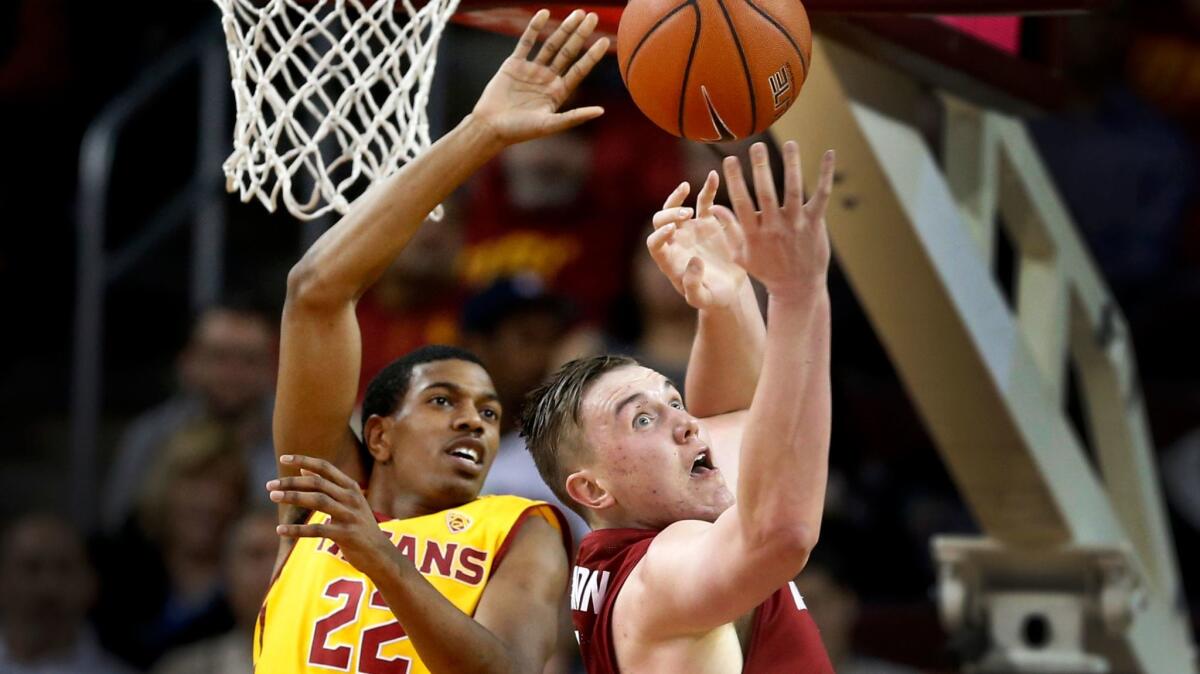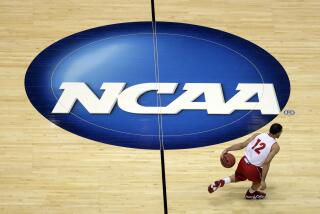Column: USC’s De’Anthony Melton remains in basketball purgatory because the NCAA won’t do its job of protecting student-athletes

The NCAA cares about De’Anthony Melton and others like him. Or so it says on its website.
Visit NCAA.org and you can read extensively about how the organization is “dedicated to the well-being and the lifelong success of college athletes.”
Click on a link of the website’s home page and you will be directed to another page with the headline, “opportunity,” the word in bright yellow and each letter capitalized. Right below, it reads, “It’s what everyone wants — and what college sports provide. More than 1,100 member schools are united around one goal: creating opportunities for college athletes.”
The declaration would be comical if not for the consequences of its hypocrisy, which have ensnared a talented 19-year-old in a Kafkaesque bureaucratic nightmare related to a federal bribery case involving USC associate head basketball coach Tony Bland.
Melton isn’t suspended, but hasn’t played in any of No. 14 USC’s five games. The promising sophomore guard isn’t accused of any wrongdoing, but has missed almost as many games as the trio of admitted shoplifters at UCLA.
The NCAA’s inflexibility has placed Melton in a position that no American should be in: He is guilty until proved innocent.
So much for the importance of his “lifelong success” or “creating opportunities” for him. The NCAA seems more interested in policing than any of that.
Now, a talented young man is in his limbo as the institutions theoretically responsible for helping him develop into a productive member of society have been paralyzed by caution: the NCAA and, to a lesser degree, USC.
“Everybody is worried about covering their own butt and nobody cares about the athlete,” said Melton’s exasperated attorney, Vicki I. Podberesky.
What was already a head-scratching situation became even more so this week, when Los Angeles Times reporter Nathan Fenno reviewed security camera footage that contradicted the FBI’s account of an August meeting involving would-be sports agent Christian Dawkins, financial advisor Munish Sood, Melton family friend Dave Elliott and an undercover FBI agent.
The criminal complaint said the undercover agent provided Dawkins with an envelope containing $5,000 that was passed on to Elliott at Brand’s direction, with the payment designed to entice Melton to retain Dawkins and Sood when he reached the NBA. Such a payment would violate NCAA rules.
But that wasn’t what transpired on the video. The footage instead showed Dawkins receiving the envelope from the undercover agent, but departing from the hotel without giving it to Elliott and stuffing it in a vehicle driven by Sood.
Podberesky said Elliott told her he didn’t take any money. The attorney also said that Melton has been cleared of any wrongdoing by the U.S. Attorney’s Office for the Southern District of New York, which is prosecuting the case, and that representatives for USC and the NCAA have reviewed the above-mentioned security camera footage. Melton has provided bank and phone records. But that book on Melton remains open.
“How much is enough?” Podberesky said. “They got beyond a reasonable doubt.”
And they will have trouble obtaining any more. Podberesky said the NCAA’s legal counsel told her it has instructed the NCAA to not look into the matter because it didn’t want the organization to interfere with the FBI’s investigation. USC is also on hold.
“USC continues to work vigorously gathering information to resolve De’Anthony Melton’s potential eligibility issue,” the school said in a statement. “De’Anthony has been cooperative throughout the process. USC is diligently seeking similar cooperation from others in order to determine whether any NCAA rules were violated.”
The statement went on to say that while USC wanted Melton to return, the university was obligated to protect the entire athletic program.
“Participation in competition by an ineligible student-athlete could lead to forfeiture of games and other NCAA penalties,” the university said.
In other words, USC won’t play Melton until it concludes an investigation slowed down by uncooperative subjects or receives assurances from the NCAA that Melton’s participation won’t result in forfeits if improprieties are uncovered later. And it doesn’t sound as if the NCAA will make such assurances without conducting its own investigation, something the government instructed it not to do.
So Melton is waiting on USC, which is waiting on the NCAA, which is waiting on the U.S. Attorney’s Office, which still doesn’t have a trial date for Bland, Dawkins or any of the six others who were indicted by a grand jury in connection to the case.
“It could be years,” Podberesky said.
And the clock is ticking on Melton, as it does for all athletes.
Last year, the 6-foot-4 guard helped shut down Lonzo Ball in an upset of then-No. 8 UCLA. Melton was invited to USA Basketball’s under-19 training camp over the summer. He was one of the 20 players named to the watch list for the Jerry West Award, which recognizes the top shooting guard in the nation.
This is an important stage of development for Melton, who could develop into a future first-round draft pick or never be drafted if he fails to improve his game.
“He’s the person that loses out the most, has the most to lose and contributes the most to the school’s economic success,” Podberesky said.
The Trojans are three weeks into their season. Enough is enough. It’s time for the NCAA to apply common sense to what is obviously a complicated situation. Grant USC the assurances it wants. If Melton is found to have violated any rules, declare him ineligible then.
By doing that, the NCAA can finally live up to its stated mission.
Follow Dylan Hernandez on Twitter @dylanohernandez
More to Read
Go beyond the scoreboard
Get the latest on L.A.'s teams in the daily Sports Report newsletter.
You may occasionally receive promotional content from the Los Angeles Times.










